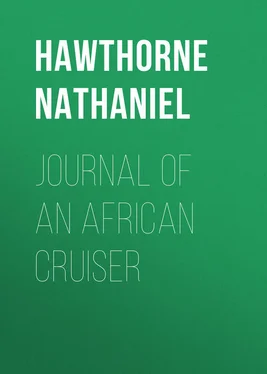Nathaniel Hawthorne - Journal of an African Cruiser
Здесь есть возможность читать онлайн «Nathaniel Hawthorne - Journal of an African Cruiser» — ознакомительный отрывок электронной книги совершенно бесплатно, а после прочтения отрывка купить полную версию. В некоторых случаях можно слушать аудио, скачать через торрент в формате fb2 и присутствует краткое содержание. Жанр: literature_19, foreign_antique, foreign_prose, на английском языке. Описание произведения, (предисловие) а так же отзывы посетителей доступны на портале библиотеки ЛибКат.
- Название:Journal of an African Cruiser
- Автор:
- Жанр:
- Год:неизвестен
- ISBN:нет данных
- Рейтинг книги:5 / 5. Голосов: 1
-
Избранное:Добавить в избранное
- Отзывы:
-
Ваша оценка:
- 100
- 1
- 2
- 3
- 4
- 5
Journal of an African Cruiser: краткое содержание, описание и аннотация
Предлагаем к чтению аннотацию, описание, краткое содержание или предисловие (зависит от того, что написал сам автор книги «Journal of an African Cruiser»). Если вы не нашли необходимую информацию о книге — напишите в комментариях, мы постараемся отыскать её.
Journal of an African Cruiser — читать онлайн ознакомительный отрывок
Ниже представлен текст книги, разбитый по страницам. Система сохранения места последней прочитанной страницы, позволяет с удобством читать онлайн бесплатно книгу «Journal of an African Cruiser», без необходимости каждый раз заново искать на чём Вы остановились. Поставьте закладку, и сможете в любой момент перейти на страницу, на которой закончили чтение.
Интервал:
Закладка:
Mounting again, we rode out of town more quietly than we had entered it. A sergeant was drilling some twenty negro soldiers in marching and wheeling. His orders were given in a quick, loud tone, and enforced by the occasional application of smart blows of a rattan to the shoulders of his men. Suspecting that the blows fell thicker because we were witnesses of his discipline, it seemed a point of humanity to hasten forward; especially as the approach of night threatened to make our journey still more perilous than before. After riding about three miles, we met two well-dressed mulatto women on donkeys, accompanied by their cavaliers. Of course, we allowed the ladies to pass between us and the rock; a matter of no slight courtesy in such a position, where there was a very uncomfortable hazard of being jostled headlong down the precipice. We escaped, however, and spurring onward through the gloom of night, passed unconsciously over several rough spots where we had dismounted in the morning. The last mile of our mountain-ride was lighted by the moon; and, as we descended the last hill, the guide gave a shrill whistle, to which the boat's crew responded with three cheers for our return.
A good night's rest relieved us of our fatigue. The following morning, with a fair breeze and a six hours' sail, we reached our floating-home, and have ever since entertained the mess-table with the "yarn" of our adventures; until now the subject is beginning to be worn thread-bare. But, as the interior of the island of St. Antonio is one of the few regions of the earth as yet uncelebrated by voyagers and tourists, I cannot find in my heart to spare the reader a single sentence of the foregoing narrative.
CHAPTER V
Arrival of the Macedonian – Return to the Coast of Africa – Emigrants to Liberia – Tornadoes – Maryland in Liberia – Nature of its Government – Perils of the Bar – Mr. Russwurm – The Grebo Tribe – Manner of disposing of their Dead.
September 9. – Weighed anchor, and stood out to sea. At 8 o'clock A.M., made the frigate Macedonian. She saluted the broad pennant, and both ships bore up for Porto Grande, where we anchored, and read the news from home.
11. – The Commodore left the ship, and hoisted his broad pennant on board the Macedonian.
16. – Sailed at 6 o'clock P.M., for Porto Praya.
17. – Anchored at Porto Praya, where we find the Decatur, which arrived yesterday, after a passage of forty-five days from Norfolk.
22. – Sailed in the evening for the coast.
October 7. – Off Cape Mount.
8. – Ashore at Monrovia. It being Sunday, we attended the Methodist Church. Mr. Teage, editor of the Liberia Herald, preached an appropriate and well-written discourse, on occasion of admitting three men and a woman to church-membership. One of the males was a white, who had married a colored woman in America, and came out to the colony with Mr. McDonough's people, some time ago. His wife being dead, he has married another woman of color, and is determined to live and die here.
10. – Dined with the Governor. Visited the house of a poor colonist, a woman with two children and no husband. She endeavors to support her family by washing. Two or three, other women of the neighborhood dropped in. It is said that the proportion of female emigrants to males is as three and a half to one. Unless it be expected that these women are to work in the fields, it is difficult to imagine how they are to earn a subsistence. A little chance washing and sewing, not enough to employ one in ten, is all they have to depend upon. The consequence is, that every person, of even moderate means of living, has two or three women to feed and clothe. They do not need their services, but cannot let them starve. This is one of the drawbacks upon Colonization.
Even the able-bodied men are generally unfit for promoting the prosperity of the colony. A very large proportion of them are slaves, just liberated. Accustomed to be ruled and taken care of by others, they are no better than mere children, as respects the conduct and economy of life. In America, their clothes, food, medicines, and all other necessaries, have been furnished without a thought on their own part; and when sent to Liberia, with high notions of freedom and exemption from labor (ideas which with many are synonymous), they prove totally inadequate to sustain themselves. I perceive, in Colonization reports, that the owners of slaves frequently offer to liberate them, on condition of their being sent to Liberia; and that the Society has contracted debts, and embarrassed itself in various ways, rather than let such offers pass. In my opinion, many of the slaves, thus offered, are of little value to the donors, and of even less to the cause of Colonization. Better to discriminate carefully in the selection of emigrants, than to send out such numbers of the least eligible class, to become burdens upon the industrious and intelligent, who might otherwise enjoy comfort and independence. Many a colonist, at this moment, sacrifices his interest to his humanity, and feels himself kept back in life by the urgent claims of compassion.
The Society allows to new emigrants provisions for six months. After that period, if unable to take care of themselves, they must either starve, or be supported by the charitable. Fifty young or middle-aged men, who had been accustomed to self-guidance in America, would do more to promote the prosperity of the colony, than five hundred such emigrants as are usually sent out. The thievish propensity of many of the poor and indolent colonists is much complained of by the industrious. On this account, more than any other, it is difficult to raise stock. The vice has been acquired in America, and is not forgotten in Africa.
13. – A rainy morning. Last night we were all roused from sleep by the sea coming into the starboard air-ports. We of the larboard side laughed at the misfortune of our comrades, and closed our own ports, without taking the precaution to screw them in. Half an hour afterwards, a very heavy swell assailed us on the larboard, beat in all the loose ports, and deluged the rooms. I found myself suddenly awakened and cooled by a cataract of water pouring over me. Out jumped the larboard sleepers, in dripping night-gear, and shouted lustily for lights, buckets, and swabs; while the starboard gentlemen laughed long and loud, in their turn.
14. – Sailed for the leeward.
17. – Beautiful weather. This afternoon all hands were called to shorten sail, in those earnest, startling tones, which are prompted by the sense of danger alone. Every man sprang to his station with the instinctive readiness of disciplined seamen. The idlers were all on deck, and looked about for the cause. Had a man fallen overboard? No! Nor was there any particular appearance of a squall. But the earnest gaze of the commander and a passenger, towards the shore, drew all eyes in the same direction; and, behold! a smoke was seen rising from the land, which had been mistaken for the cloud that precedes the tornado. It is necessary to prepare for many blows that do not come. In the tornado-seasons (which may be estimated at four or five weeks, about the months of March and November), there are frequent appearances of squalls, sometimes as often as twice or thrice in twenty-four hours. The horizon grows black, with very much the aspect of a thunder-shower in America. Generally, the violence of the wind does not equal the apprehensions always entertained. We could have carried royals through nineteen out of twenty of the tornadoes that assailed our ship; but the twentieth might have taken the sticks out of us. The harmless, as well as the heavy tornadoes, have the same black and threatening aspect. They usually blow from the land, although once, while at anchor, we experienced one from seaward.
Читать дальшеИнтервал:
Закладка:
Похожие книги на «Journal of an African Cruiser»
Представляем Вашему вниманию похожие книги на «Journal of an African Cruiser» списком для выбора. Мы отобрали схожую по названию и смыслу литературу в надежде предоставить читателям больше вариантов отыскать новые, интересные, ещё непрочитанные произведения.
Обсуждение, отзывы о книге «Journal of an African Cruiser» и просто собственные мнения читателей. Оставьте ваши комментарии, напишите, что Вы думаете о произведении, его смысле или главных героях. Укажите что конкретно понравилось, а что нет, и почему Вы так считаете.












